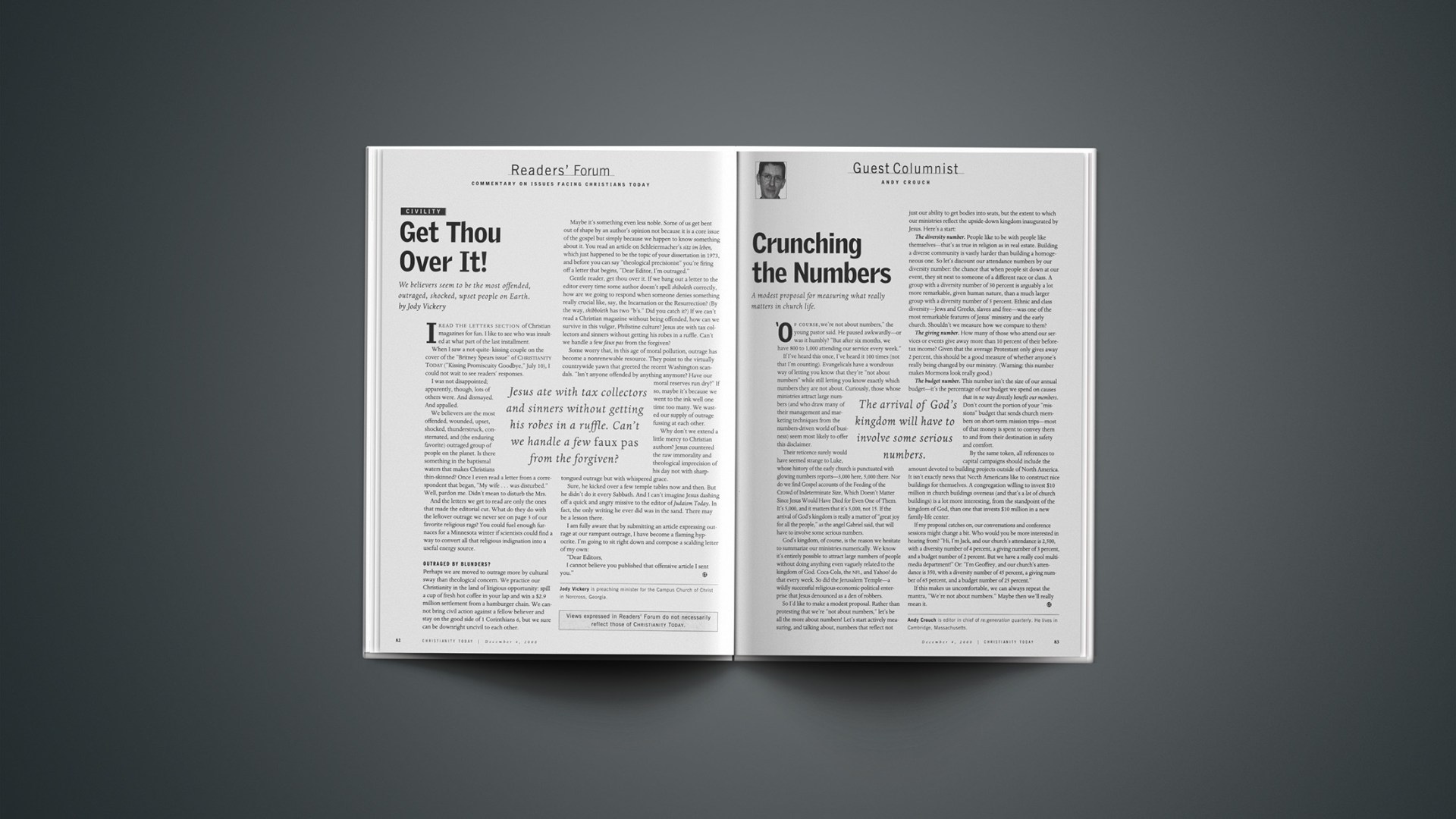Of course, we’re not about numbers,” the young pastor said. He paused awkwardly—or was it humbly? “But after six months, we have 800 to 1,000 attending our service every week.”
If I’ve heard this once, I’ve heard it 100 times (not that I’m counting). Evangelicals have a wondrous way of letting you know that they’re “not about numbers” while still letting you know exactly which numbers they are not about. Curiously, those whose ministries attract large numbers (and who draw many of their management and marketing techniques from the numbers-driven world of business) seem most likely to offer this disclaimer.
Their reticence surely would have seemed strange to Luke, whose history of the early church is punctuated with glowing numbers reports—3,000 here, 5,000 there. Nor do we find Gospel accounts of the Feeding of the Crowd of Indeterminate Size, Which Doesn’t Matter Since Jesus Would Have Died for Even One of Them. It’s 5,000, and it matters that it’s 5,000, not 15. If the arrival of God’s kingdom is really a matter of “great joy for all the people,” as the angel Gabriel said, that will have to involve some serious numbers.
God’s kingdom, of course, is the reason we hesitate to summarize our ministries numerically. We know it’s entirely possible to attract large numbers of people without doing anything even vaguely related to the kingdom of God. Coca-Cola, the NFL, and Yahoo! do that every week. So did the Jerusalem Temple—a wildly successful religious-economic-political enterprise that Jesus denounced as a den of robbers.
So I’d like to make a modest proposal. Rather than protesting that we’re “not about numbers,” let’s be all the more about numbers! Let’s start actively measuring, and talking about, numbers that reflect not just our ability to get bodies into seats, but the extent to which our ministries reflect the upside-down kingdom inaugurated by Jesus. Here’s a start:
The diversity number. People like to be with people like themselves—that’s as true in religion as in real estate. Building a diverse community is vastly harder than building a homogeneous one. So let’s discount our attendance numbers by our diversity number: the chance that when people sit down at our event, they sit next to someone of a different race or class. A group with a diversity number of 30 percent is arguably a lot more remarkable, given human nature, than a much larger group with a diversity number of 5 percent. Ethnic and class diversity—Jews and Greeks, slaves and free—was one of the most remarkable features of Jesus’ ministry and the early church. Shouldn’t we measure how we compare to them?
The giving number. How many of those who attend our services or events give away more than 10 percent of their before-tax income? Given that the average Protestant only gives away 2 percent, this should be a good measure of whether anyone’s really being changed by our ministry. (Warning: this number makes Mormons look really good.)
The budget number. This number isn’t the size of our annual budget—it’s the percentage of our budget we spend on causes that in no way directly benefit our members. Don’t count the portion of your “missions” budget that sends church members on short-term mission trips—most of that money is spent to convey them to and from their destination in safety and comfort.
By the same token, all references to capital campaigns should include the amount devoted to building projects outside of North America. It isn’t exactly news that North Americans like to construct nice buildings for themselves. A congregation willing to invest $10 million in church buildings overseas (and that’s a lot of church buildings) is a lot more interesting, from the standpoint of the kingdom of God, than one that invests $10 million in a new family-life center.
If my proposal catches on, our conversations and conference sessions might change a bit. Who would you be more interested in hearing from? “Hi, I’m Jack, and our church’s attendance is 2,500, with a diversity number of 4 percent, a giving number of 3 percent, and a budget number of 2 percent. But we have a really cool multimedia department!” Or: “I’m Geoffrey, and our church’s attendance is 350, with a diversity number of 45 percent, a giving number of 65 percent, and a budget number of 25 percent.”
If this makes us uncomfortable, we can always repeat the mantra, “We’re not about numbers.” Maybe then we’ll really mean it.
Andy Crouch is editor in chief of re:generation quarterly. He lives in Cambridge, Massachusetts.
Related Elsewhere
Andy Crouch was part of Christianity Today‘s panel discussion of postmodernism, “The Antimoderns.” Crouch also wrote “What Exactly Is Postmodernism?” to better define the term for Christian discussions.
Crouch is editor-in-chief of re:generation quarterly. Until June 2000 he was a campus minister with InterVarsity Christian Fellowship at Harvard University.
Crouch also wrote for Christianity Today’s 1996 “Up & Comers” issue. His article, “A Generation of Debtors | A Gen-Xer reflects on the deficits bequeathed to his generation and on its fear of redemption,” still appears on our Web site.
Listen to some of Andy’s Crouch’s talks given to the Harvard and Radcliffe’s IVC Fellowship
Christianity Today took a look at numbers from a missions perspective in “Getting Beyond the Numbers Game.”
Christianity Today‘s sister magazine, Leadership, has covered the numbers topic often:
Healthy Numbers | Doctors count cholesterol, bankers count dollars. What should you count? (Winter 1999)
Big Ambitions, Small Church | When our whole family felt the pinch, I adjusted my expectations. (Winter 1999)
Freed From Needing the Numbers | A better way to count what matters. (Summer 1998)
Copyright © 2000 Christianity Today. Click for reprint information.










